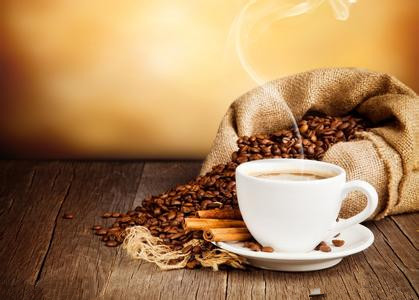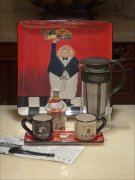General knowledge of Fine Coffee Culture Coffee in Ancient Times
The Puritans usually held a skeptical and hostile attitude towards pleasure. Max Weber said in Protestant Ethics and the Spirit of Capitalism: "any unrestrained enjoyment of life, whether it is the sports of the aristocracy or the indulgence of ordinary people in the dance floor or hotel, will drive people to abandon their duties and deviate from religion." therefore, it should be the enemy of rational asceticism. " Although beer was already a very mild drink compared to the spirits of the Industrial Revolution, it was still the target of the Puritans in the Reformation more than 200 years before the Industrial Revolution. In many cartoons recording the food scenes at that time, many drunken citizens were vilified, showing the heads and other features of animals such as monkeys, pigs and donkeys. "drunkenness" is visualized as a specific devil, often appearing near the wine cup.

In the 16th and 17th centuries, however, Puritan propaganda alone was not enough to shake people's love of beer. There must be some material reason for the decline in beer consumption: the socio-economic development and the gradual refinement of the industry division of labor have higher and higher requirements for workers, which limits the amount of alcohol they can drink every day. At this time, a new drink stepped in to meet people's new needs outside the wine glass. In the 17th century, Europeans discovered a new drink coffee that could replace beer soup.
In an English poem written in 1674, it was written:
When the muddy beer fogs our consciousness
God sent us healthy fruit.
……
Here comes the coffee, this drink is warm, thought-provoking and forceful.
Let the sad person cheer up and awaken the enthusiasm of life
It is so abstemious that there is no sense of indulgence.
It can be seen from this poem that people are used to giving spiritual meaning to a drink. We can compare it to the Book of Romans in 56 AD: "Lord, thank you for giving us beer, because of your grace, it gushes out of the heart of cereal. Cure our diseases. Please bless everyone who calls your name and let them get the well-being of body and soul from beer. "
In the context of western culture, the relationship between wine and spirit has always been inseparable. Because alcohol enters the bloodstream much faster than food, people tend to think that alcohol is more spiritual than food. In biblical tradition, wine symbolizes the blood of Jesus. When the world drinks at the Eucharist, it is with the Lord. This spiritual role shift from beer to coffee represents a new understanding of the spiritual value that beverages can carry.
Coffee's conquest of beer first comes from its pharmacological function. When people are delirious from drinking, a cup of coffee can often wake him up. In this sense, coffee and beer constitute a dualistic opposition of sobriety / ecstasy. In an era that calls for rationality and work efficiency, the popularity of coffee has almost become an irreversible trend. Coffee is more functional than enjoyable, which is destined to be a daytime drink. And beer belongs to evening and night. In the 17th century, people's understanding of coffee is not very comprehensive, it is obviously not as warm as the poem said, on the contrary, drinking coffee on an empty stomach will accelerate the secretion of stomach acid, causing retching. Compared with the health benefits of beer, its benefits are more spiritual. People feel excited after drinking coffee, have a better memory, and do not have the same decline in excitement as drinking, so it is easy to believe that this drink is good for reason and speculation. Cafes have become popular in Europe since the 17th century.
Since ancient times, drinking beer has been a collective behavior, even strangers will propose a toast to each other, toast, show each other's friendship. In repeated behaviors (cheers), people develop a sense of ritual with each other, and this connection based on excitement is strengthened over and over again. The behavior of coffee is completely different from that of beer. First of all, coffee is a kind of hot drink, which needs to be heated before drinking, and people can't drink cup after cup. Secondly, the excitement of coffee will not be enhanced by drinking too much, so people abandon the ritual of drinking beer. There is no toast or toast. Naturally, there will not be a sense of community. In other words, beer brings the consciousness of "us", while coffee is "me". And this "I" will get stronger and stronger because of caffeine. In coffee shops that can be seen everywhere on the street, it is most common for people to read a newspaper in front of a cup of coffee alone.
Coffee wakes people up, reduces sleep, suppresses sexual desire and helps people develop self-awareness. The three points are clear enough: if beer represents the Middle Ages, coffee was an ideal drink for Puritans during the Reformation. Beer, as a light entertainment, is in an awkward position in front of coffee. Compared with spirits, beer is moderate enough, but compared with coffee, the entertainment brought by beer is a waste of energy. The dichotomy of day / night, sobriety / intoxication, temperance / indulgence gives a class color to drinks, and the effect of coffee in reducing sleep time also means squeezing more working time out of the traditional concept of time. Calvinism, the middle class's efforts to accumulate wealth is regarded as a sign of loyalty to God, so it makes sense that coffee has become the preferred drink of the middle class. Although alcohol is not banned, it is suppressed by mainstream ideology and banished to private spaces and "inferior" taverns.
Important Notice :
前街咖啡 FrontStreet Coffee has moved to new addredd:
FrontStreet Coffee Address: 315,Donghua East Road,GuangZhou
Tel:020 38364473
- Prev

Night coffee in Greece, one of the ancient civilizations in the world.
Greece is one of the ancient civilizations in the world, located in southern Europe, bordering on the Mediterranean, sunny, mild climate, fresh air, is a famous tourist resort in Europe. When I came back from a trip to Greece, a friend asked me, what impressed you most about Greece? I said, it's Greek night coffee. Before coming to Greece, a Wenzhou businessman who had been doing business in Europe for more than ten years once told me that Greece
- Next

The Cultural History of Fine Coffee the Origin of Ice drop Coffee
Ice drop coffee originated from the Indonesian island of Java, which was a Dutch colony in the 17th century. It is said that the coffee extraction method used here was introduced by Dutch businessmen, so it was named Dutch coffee Dutch Coffee. This kind of coffee drips with ice water for a long time, so it is also called coldbrew coffee cold (ice brew) or water drip coffee (ice drop). Ice
Related
- How did the Salvadoran coffee industry develop in Central America?
- What exactly does the golden cup extraction of coffee mean?
- The Origin of Coffee flower
- [2023 Starbucks World Earth Day] there are more meaningful things besides free Starbucks coffee!
- What kind of coffee is there in Spain? 9 Flavors of Spanish Coffee
- Aromatic African coffee| Kenya's coffee culture and historical production area
- Liberica Coffee Bean knowledge: the characteristics of Liberian Coffee beans of the three original species of Coffee beans
- The origin and formula of Spanish latte introduces the taste characteristics of Bombon coffee in Valencia, Spain.
- How to adjust the solution of over-extracted coffee
- What is the tasting period of coffee beans? What is the period of coffee and beans? How should coffee wake up and raise beans?

